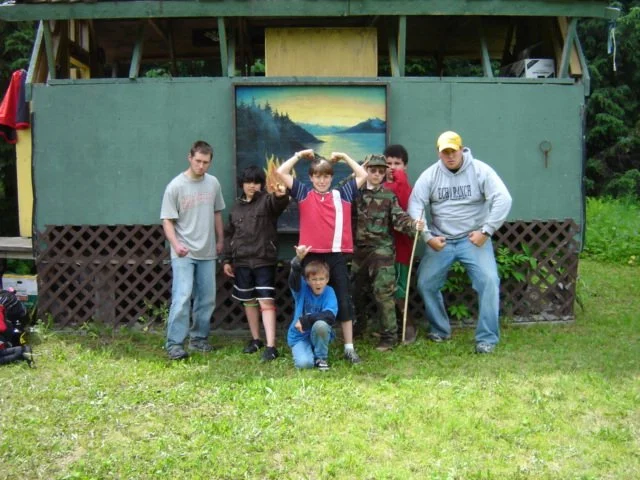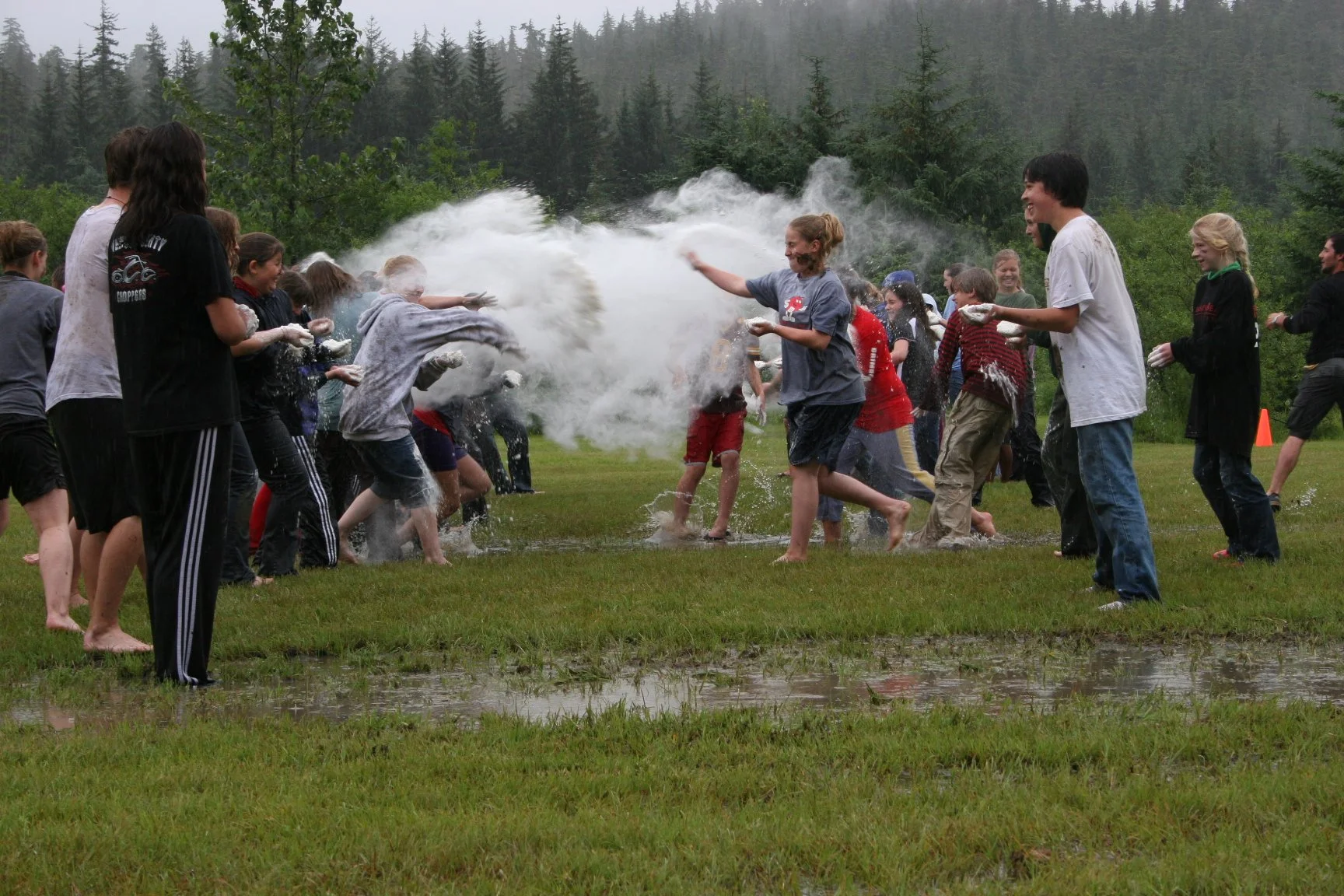ERBC Through the Decades: the 2000s
Time and time again, it seems the Lord likes to call people to Echo Ranch who would otherwise absolutely never think of coming to serve in Alaska. That pattern continued with the next two camp directors after Gary Lidholm left Echo Ranch to take on a pastoral position in Haines.
Hailing from central Indiana, Randy Beaverson heard about camp through former camp director Dean Diller, the father of his sister-in-law’s husband. Dean encouraged him to visit Echo Ranch to be a camp speaker, and Randy, who always wanted to visit Alaska anyway, did so for two weeks in the summer of 1997. But he left Alaska after those two weeks with no thought of returning. However, in 2001, as ERBC was between directors, Randy and his wife Valerie felt their time in Indiana was ending. As they prayed about what was next for them, they heard – again through Dean Diller – that ERBC was in the process of searching for a new director. Randy and Valerie promised to consider it, but at first didn’t take it very seriously. But the Echo Ranch opportunity kept coming up in the Beaversons’ conversations and in their hearts, and so they decided to make a winter visit to Alaska to meet with the other ERBC staff, visit camp, and even go to Haines to spend some time talking with the Lidholms about what it looks like to be camp director. Surprising themselves, by the end of the visit, Randy and Valerie realized that they had already made their decision; the Lord seemed to be calling them to Echo Ranch.
That decision was made in February; the Beaversons decided that they wanted to move to Juneau by April. In a whirlwind of activity, they sold off possessions, raised money from supporters, started packing, and booked a U-Haul to drive up to Alaska. One little detail still had yet to be figured out – where they would live when they got to Juneau. There was still no answer to this question all the way until midway through the drive through Canada. One day as they were driving, though, a large apartment for rent in Juneau was brought to their attention – and it just so happened to be the upper story of a duplex whose lower occupants were Jake and Hilda Hoffman, ERBC’s first camp directors. This arrangement turned out to be an incredible blessing from the Lord, as Jake and Hilda were not only able to advise Randy and Valerie about leading Echo Ranch, but also served as surrogate grandparents to the Beaverson children, who were eight and ten years old at the time. The Beaversons became very close with the Hoffmans and were so grateful that God had prepared the way for them in Juneau so abundantly. It’s another entry in the files of God’s miraculous provision throughout the history of ERBC.
From left to right: Randy Beaverson (ERBC director 2001-2004), Gary Lidholm (ERBC director 1996-2000), Dean Diller (ERBC director 1984-1996), and Jake Hoffman (ERBC director 1964-1966).
The story of the next director after Randy Beaverson wasn’t too different. Rick Shaner, who worked in public education in small-town northwest Ohio, visited Echo Ranch on brief trips a couple of times with his wife Pat, in 1989 and 1999. Alaska and camp ministry certainly weren’t on their minds as long-term options; as the 21st century began, Rick was getting ready to start his retirement, for which his plans consisted of buying a boat and enjoying long days on Ohio’s lakes. But over a couple of years, God worked on the Shaners’ hearts and started to steer them, too, toward His plan for them in Alaska. By 2003, Rick and Pat knew that God was calling them to join the full-time ministry team at Echo Ranch, and so they sold their house and started their journey up to Juneau. Rick would take on the camp director role in 2005 upon Randy Beaverson’s departure.
During Randy’s and Rick’s tenures as camp directors, much of the summer camp programming saw upgrades and revamps to inject fresh energy into what was now a decades-old camp program. ERBC had been seeing a gradual decline in registrations for older campers as they grew tired of the same camp activities with age. So, Randy led the camp staff in putting their heads together to figure out how to make summer camp appealing to all ages, with new activities that would attract kids year after year. A go-cart course was created behind the mechanic shop, and campers absolutely loved racing around and flinging mud all over themselves. A batting cage and a renovated zipline were constructed, a bounce house was purchased for the younger kids’ carnivals, and night games were introduced for older campers – still to this day one of the highlights of the week for middle school and high school campers.
An initiative for improved camp facilities also led to a lot of construction throughout the decade, producing buildings like a new bathhouse on the boys’ side of camp, cabins with electricity set aside for guests and work teams, and a separate building for the Trading Post, the camp store (which was originally in the old chapel barn, then in a room in the Diller Fieldhouse). Other “modernizations” were also gradually introduced in these years: the ice machine in the Dining Hall, allowing for cold drinks and cold compresses to be made at a moment’s notice; vehicle lifts in the mechanic shops both at camp and in Auke Bay, making vehicle repairs much easier; an antenna installed in the camp office, so phone calls could be made to town; and even internet access, introduced in 2004. It was limited then and it’s limited now, but the once very isolated community of Echo Ranch was finally connected to the outside world in a huge way.
Beyond these innovations at base camp, the staff explored adventurous opportunities that took campers outside the normal camp grounds. A separate horse camp was built in 2004, where small groups of campers would stay for a week dedicated to learning about riding and caring for horses. The Sourdough (Wilderness) Camp program also continued to grow, reaching a milestone with a 200-mile canoe camp down the Yukon river in 2004. Overall, the 2000s were a decade of huge growth for Echo Ranch’s programming, and the period in which a lot of the features that define camp today originated.
Horse camp, constructed in 2004 and utilized through 2017.
Sourdough / Wilderness Camp. Although no longer utilized regularly, these structures still stand today about a mile and a half from ERBC’s main site.
However, the 2000s, much like the other decades of ERBC history, weren’t without their share of disaster. In 2006, the horse barn that had been in use for nearly twenty years to house the Echo Ranch herd and store all the supplies needed for the horse program, burnt to the ground. While, fortunately, no people or horses were harmed in the fire, everything inside was lost, including thousands of dollars’ worth of saddles and tack. (Images captured the night of the fire, and the aftermath the next day, are shown below.) It was a situation reminiscent of the fire that destroyed the first dining hall back in the ‘70s; what would the staff do in the wake of the tragedy? Simply cease to offer horse rides?
Well, much like He did in the aftermath of the dining hall fire, God showed his abundant provision to Echo Ranch through the communities that ERBC had touched. Friends of camp in Juneau and beyond rallied to raise the money to replace everything that had been lost in the barn fire, and even to fund the building of a new barn. In a remarkably short time, the costs of new saddles and tack had been completely covered by donations, and before long the current horse barn was constructed, complete with an upper story apartment.
It's just another entry in the myriad files of the times the Lord has sustained and blessed ERBC in ways that so clearly show His control and care over everything, even terrible situations that leave us reeling with no idea what to do. When we trust ourselves and our circumstances to the Lord’s care, He is fully capable and firmly faithful to provide for us time after time. His faithfulness is the whole reason Echo Ranch has endured and grown throughout all these decades.










